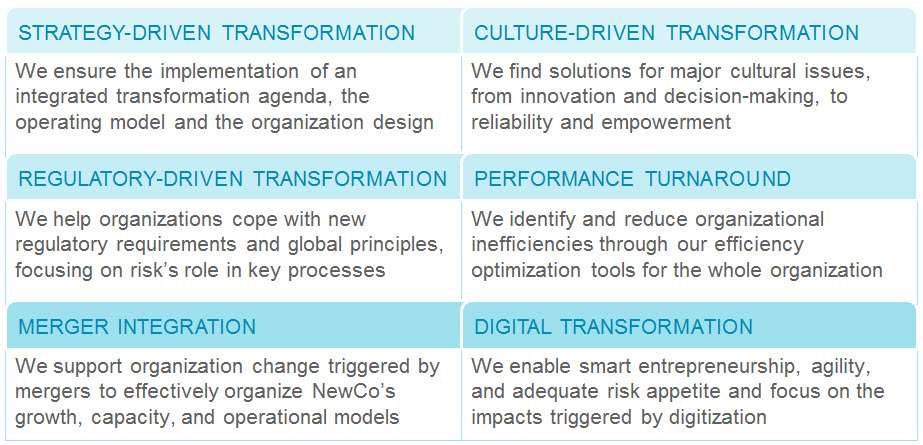Oliver Wyman’s Transformation Checklist is designed to support industry leaders through complex transformational journeys. We concretely:
- Initiate and mobilize the transformation through senior leadership alignment, evaluate transformation needs, assess capabilities, and cultivate desired culture, norms and behaviors.
- Develop the targeted organization design blueprint through guiding principles and the future state Transformation Management Office (TMO).
- Select and develop engagement tools, strategic communications and an effective “transformation cockpit” for monitoring specific key performance indicators throughout the execution of the transformation.
- Act as “Trusted Advisor” for the Top Management and the transformation leaders.
Our techniques have been field tested through hundreds of successful engagements supporting a range of transformation scopes, from singular functions such as Engineering or Marketing or Sales, to companywide initiatives, across nearly every industry.
Our unique value proposition lies in the combination of deep industry expertise and broad knowledge of organizational effectiveness and organizational transformation methodologies.
We do not work “for” our clients but “with” our clients, catalyzing the long-term effectiveness and success of their managers and workforce.
Marcus Neudel, Partner, details Oliver Wyman's 10 point Transformation Checklist.
Six demand signals for companywide transformation
We work with clients to architect and facilitate successful transformation initiatives alongside specific business environments and dynamics firm-wide or functionally.

How to get started?
Managing change is the ability to get organizations transformed to the future state in a well-balanced approach of technical and social conditions. A holistic approach can increase the willingness to pursue change through transformation. Four key factors are needed for success in our view:
- The top-management has to use one language regarding the “sense of urgency”, i.e. why, what, how, when the transformation is required and who is affected
- Manager and staff have to be “engaged” to perform the transformation together. They have to understand the consequences of their actions and behavior in their daily decisions and ways of working
- The Transformation & Change-Management leaders have to identify risks, fear and opportunities of the transformation and have to act and mitigate accordingly
- Managers at all levels have to communicate strategically in an effective way and open modern feedback channels through social and other media to reach a broad buy-in of workforce


